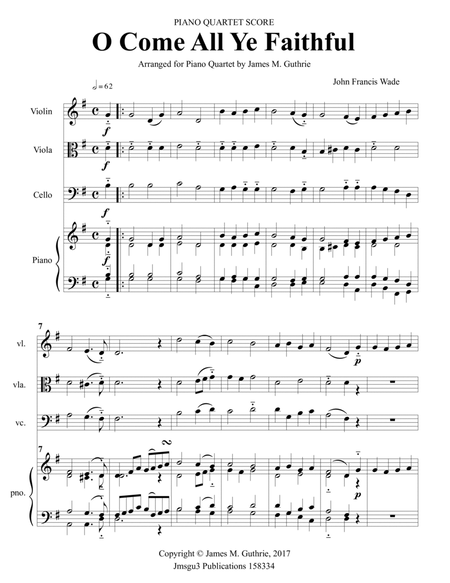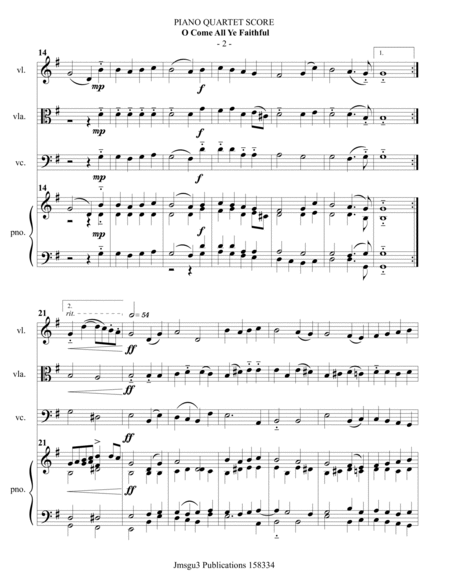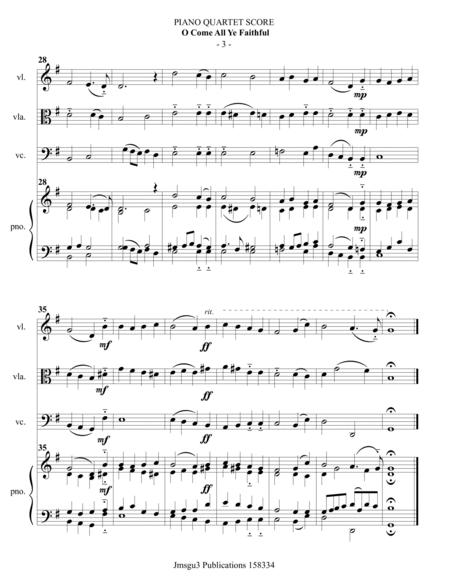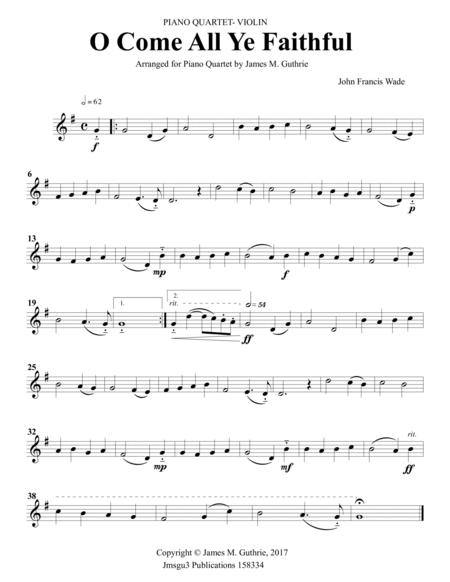O Come All Ye Faithful for Piano Quartet
 Instant Download
Instant Download
Details
Description
SKU: A0.548646
Composed by Wade. Arranged by James M. Guthrie, ASCAP. Christmas. 8 pages. Jmsgu3 #3407471. Published by jmsgu3 (A0.548646).
O Come, All Ye Faithful
The traditional "Adeste Fideles" was arranged for a piano quartet ( piano, violin, viola & cello) featuring a thought-provoking re-harmonized final verse. O Come, All Ye Faithful is an English translation of the Latin Christmas carol Adeste Fideles. No one knows exactly who wrote it. One theory holds that King John IV of Portugal (1604–1656) wrote it. Another view says John F. Wade or John Reading wrote it. Nowadays, we usually attribute it to John Wade. It seems like Stonyhurst College in Lancashire owns the oldest manuscript. It is from the year 1751. Nevertheless, the O Come All Ye Faithful: Piano Quartet version has a re-harmonized final verse for more energy and drive.
Lyrics
Frederick Oakeley, a Catholic priest in 1841, wrote the English translation. This translation is probably the most common in English-speaking states. To begin with, the hymn had only four verses. Later, the verses grew to eight. Music directors often cut various verses because otherwise, the song goes too long. Some believe that St. Bonaventure wrote the first Latin lyrics. Others hold that King John IV of Portugal is responsible. Yet even others think the Cistercian monks wrote them.
King John IV
His subjects called King John IV of Portugal "The Musician King." He became king in 1640. In addition to performing the duties of a king, he composed and wrote as a music journalist. King John built an extensive music library. Unfortunately, the massive earthquake in Lisbon ruined the library in 1755. In addition to making his library, the king started a Music School that produced many accomplished musicians. The king also worked diligently to get instrumental music approved by the Vatican for use in his churches. Aside from his authorship of Adeste Fideles, he is famous for another popular choral setting of the Crux Fidelis, a prevalent Lenten hymn.
Performance in Context
Verses are sometimes left out because all eight verses would take too long to perform. More to the point, though, some of the poems may be unsuitable for whatever church calendar they are intended. The eighth verse deals with the Epiphany, so it makes sense to sing this on Epiphany Sunday but not on other Sundays. Similarly, poems are used for whether the event is Midnight Mass or regular daytime Mass.
This product was created by a member of ArrangeMe, Hal Leonard’s global self-publishing community of independent composers, arrangers, and songwriters. ArrangeMe allows for the publication of unique arrangements of both popular titles and original compositions from a wide variety of voices and backgrounds.
Digital Downloads are downloadable sheet music files that can be viewed directly on your computer, tablet or mobile device. Once you download your digital sheet music, you can view and print it at home, school, or anywhere you want to make music, and you don’t have to be connected to the internet. Just purchase, download and play!
PLEASE NOTE: Your Digital Download will have a watermark at the bottom of each page that will include your name, purchase date and number of copies purchased. You are only authorized to print the number of copies that you have purchased. You may not digitally distribute or print more copies than purchased for use (i.e., you may not print or digitally distribute individual copies to friends or students).




 Share
Share